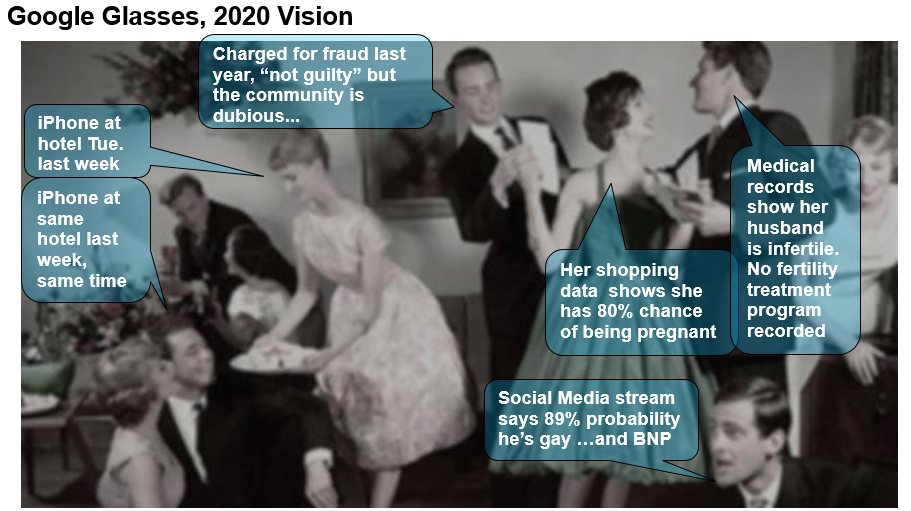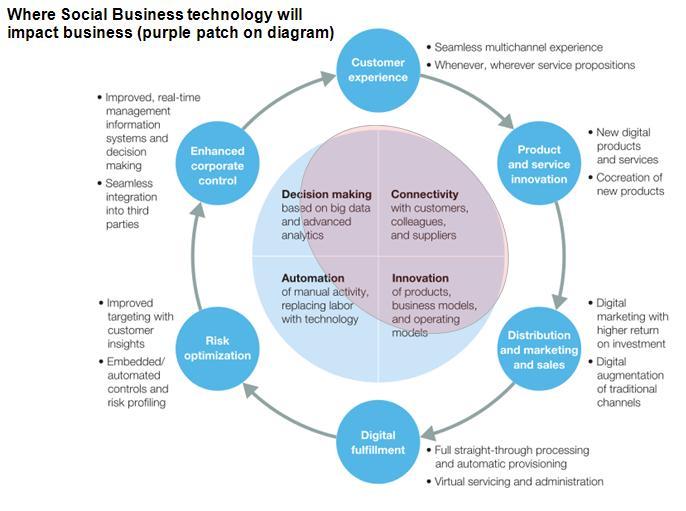“Could business become nothing more than a social object, with individuals collaborating via social networks, doing what businesses used to do?”
I put out this idea last September at our Patchwork Elephant Conference about what the future could hold for Social Business. Our first conference was hosted 4 years ago when the term ‘Social Business’ hadn’t really been coined – how rapidly things can change.
With this in mind I talked about the possible future of social + business and how, if you take an idea that can seem totally unthinkable and unacceptable, it can become thinkable given the right ‘window’ of time. This is based on the Overton Window theory that there is a narrow ‘window’ when a range of ideas will be accepted by the public. If you take a ‘way out there’ idea which appears completely unthinkable, then push it as far as you possibly can then sometimes, given the right ‘window’, that idea eventually becomes thinkable and acceptable.
Here are 2 concepts which could be possible in 40 years time. They may seem pretty unthinkable – but can they become truly thinkable if pushed to their extremes?
“What if businesses became nothing more than a social object – that’s to say that social networks would be used simply to coordinate all activities that businesses used to do?”
“Nanotechnology will destroy the present social and economic system – because it will become pointless” (James Burke on Radio 4 PM, August 2013)
James Burke was a famous BBC reporter on Tomorrow’s World in the 1970’s and chief presenter for the BBC’s coverage of the first moon landing in 1969. In 1973 he was asked to predict what life would be like in 20 years time – that’s 1993. Back in 1973 the only computers around filled floors and there were very few. There was no internet, no email, no mobile phones.
He predicted that:
- Storage of personal information in databanks would be accepted – at least by the young
- People would realise that the sharing of information would help organise society better
- Computer aided learning systems would provide children with their own plug in superteacher
- 300,000 computer terminals would be in use by the year 2000 providing forecasts on the effects of management decision making
There were in fact 146 million computers by 2000 so his timescales were a bit inaccurate but he did well. Yet in 1973 most people viewed these predictions as totally unthinkable.
So when Burke last year suggested on Radio 4 PM that in 40 years time “Nanotechnology will destroy the present social and economic system – because it will become pointless” this may sound unthinkable, but it’s probably worth thinking about…
Burke believes that it may be possible that in 40 years time we could all own personal nanofactories which could reproduce stuff on a molecular level. It should be possible to make virtually anything – for virtually nothing. All we would need, he says, is air, water, dirt, and acetylene gas (for carbon) and we could manufacture virtually everything – from gold, food, our utilities or even a house.
We could, he suggests, become entirely autonomous!
This does sound really unthinkable – but perhaps this isn’t quite so far out there as it sounds. Take the current trends of everything becoming smaller, cheaper and networked – like 3d printing and the internet of things and push this out over 40 years… Machines are already working at the molecular level – the University of Manchester has recently built one which they’re planning to modify to build penicillin.
The Endgame: Radical Abundance
So what’s the endgame with all this? Radical Abundance! The latest new new thing that’s just about to hit us and is being pushed not just by Burke but by others like Eric Drexler too.
So assuming that we could produce everything we needed, what could this mean for business? Here’s a possible snapshot:
- Production: whether goods were made at home or locally on demand it could mean that large scale manufacturing would be knocked out
- Transport: if there were no goods to be moved around the transport industry would be under threat
- Consumer facing businesses selling goods: would have serious problems
- Sales & marketing: what for if there were no goods to flog?
- Business support services: would dwindle
- Finance: a lot of the current financial system is based on betting on firms
Is this all becoming thinkable to you yet? Or at least more thinkable than before you started reading?
So let’s now return to my original concept:
“Could business become a social object with social networks acting as platforms for individuals to coordinate all the activities businesses used to do?”
Following on from Burke’s predictions perhaps now this idea doesn’t seem so far fetched. We only have to look at the current and quite sudden rise of the collaborative economy (another term which wasn’t really known 4 years ago) to see how companies in this space such as Airbnb and Uber are seriously challenging traditional business models.
Here are the beginnings of business models being redefined with individuals collaborating via social networks and relying on trusted parties, bypassing traditional hierarchical capitalist models. Platforms are being used by crowds to do what businesses used to do.
“The Future is here, it’s just not evenly distributed yet”
William Gibson‘s “The future is here, it’s just not evenly distributed yet” now springs to mind. Let’s take the social platform Airbnb to illustrate what we mean. Founded in 2008 by Brian Chesky and his roommate when they charged visitiors to sleep on their apartment floor, Airbnb has risen within 6 years to arrange 10m stays in 550 000 rooms in 34,000 cities and is likely to become the world’s largest hotelier within the next year.
As the collaborative economy expands, it’s clear that it will impact various markets, potentially reshaping them as integral parts of the social networks we engage with daily. Social networks are poised to streamline the way capacity meets demand, across the spectrum. Functions once novel, like Airbnb, Uber, and Lyft, are now foundational, much like how AOL was once a gateway to the web experience, which has since become part of our ubiquitous digital infrastructure. Similarly, online markets are evolving, with rating services becoming essential. Top rated property brands, along with other businesses, may find it inevitable to integrate as nodes within this sprawling social mesh—becoming, in essence, social objects that are inherently connected through user interactions and reputations.
The World as a Social Market
Trust and transparency will be maximised, transaction costs will be minimised. The whole trend of these social infrastructures is to drop transaction costs between buyers, sellers and information holders so the cost of bringing buyer and seller together will fall to insignificant numbers. Ronald Coase predicted this in the 1930’s. He foresaw that the inevitable outcome is that whenever possible the size of the firm will be reduced to a minimum size rather than keep all the extra functions it needs today like finance and sales etc. The size of the firm in the case of a supplier to Airbnb is nothing more than your spare room and an internet connection. Ebay was a forerunner to this – but it’s becoming clearer that eventually all the world will become a social market. Any business which tries to limit transparency and remain opaque or is trying to create arbitrage where there is none will find it difficult to compete and maintain their strategic position.
Over time, this mesh will become regulated – infrastructures always do. Electricity, water, telephony all ended up as part of the utility infrastructure and this will be no different. The main problem for the individual will be the sheer scale of the mesh – we will need tools to navigate it. Some tools will come from the infrastructure itself but we imagine that some tools will come from yourself. This ties in closely with the VRM concept of tools being created for individuals to manage and control their own data, allowing access only to those to whom they give permission. We could imagine us all owning our own smart systems with data controlled by ourselves – a bit like owning an electric appliance which you plug into the mesh – that could source the relevant data, barter the deal and present the options in order of importance, then automatically make all the necessary arrangements for you. The opportunity for profiteering in these transactions would be minimal – regulation would be complex.
Yet this is a utopian view of the world. It would rely very much on total trust and could go very wrong in bad hands. In my next post we’ll look more deeply into the shadows of a potential future for Business as a Social Object.




